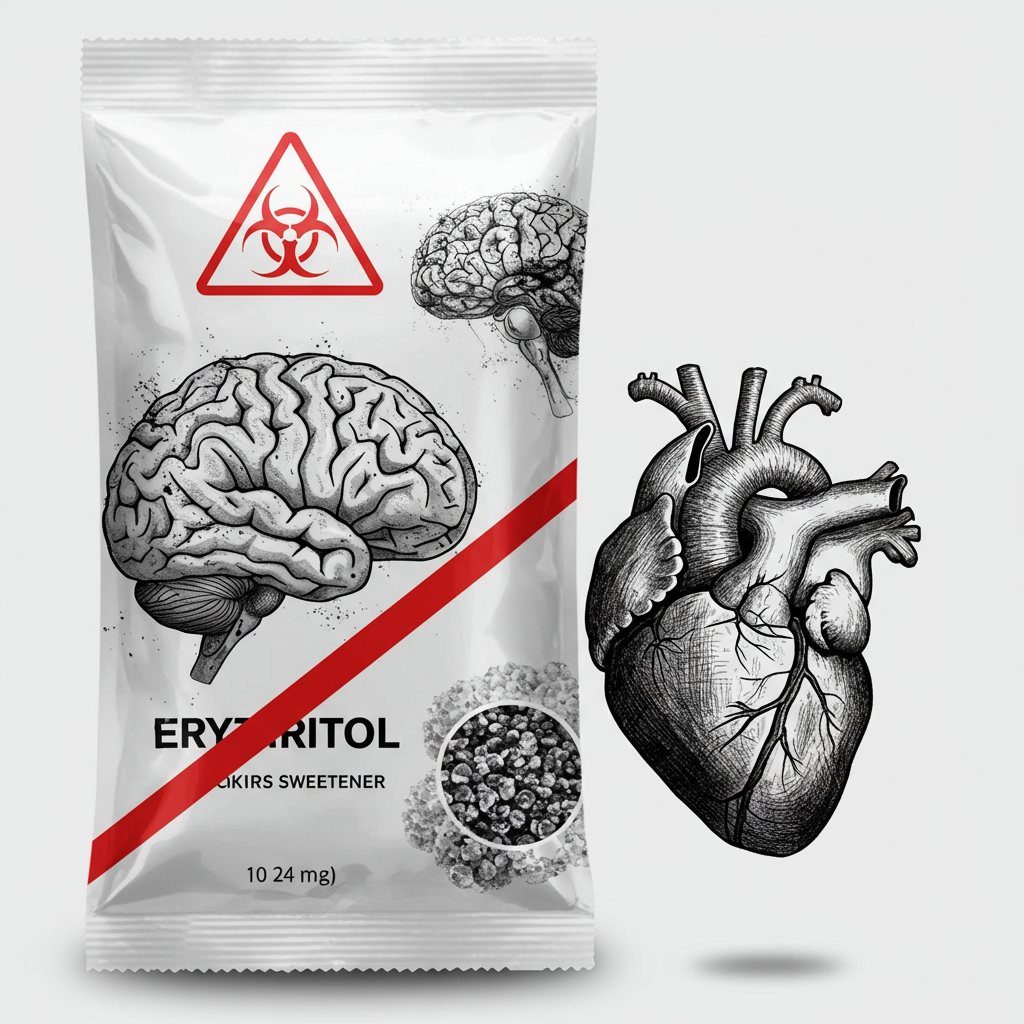A popular sugar substitute, erythritol, widely celebrated for its low-calorie profile and suitability for keto diets, is now under intense scrutiny. Recent groundbreaking research suggests this seemingly innocent sweetener might be quietly undermining your brain’s crucial defenses and significantly increasing your risk of serious cardiovascular events like heart attacks and strokes. This alarming new data challenges erythritol’s long-held reputation as a safe sugar alternative, prompting a critical re-evaluation of its pervasive presence in countless “sugar-free” and “diet” products.
Erythritol: The Sweetener Under Scrutiny
Erythritol is a sugar alcohol, a compound found naturally in small amounts in some fruits like grapes and pears. However, the erythritol used in commercial products is mass-produced through the fermentation of corn or wheat starch. It gained immense popularity for its sugar-like taste (about 80% as sweet as sugar) without the calories or the blood sugar spikes, making it a go-to for diabetics, those on ketogenic diets, and anyone looking to reduce sugar intake. It’s prevalent in everything from protein bars and energy drinks to diet sodas and certain “stevia” blends.
Unlike artificial sweeteners such as aspartame or sucralose, erythritol’s “natural” classification allowed it to sidestep recent World Health Organization guidelines that cautioned against artificial sweeteners for weight management. This distinction, combined with its favorable digestive profile compared to other sugar alcohols, cemented its position as a “safe” and superior sugar substitute in the market.
Alarming Discoveries: A Threat to Brain and Heart
Groundbreaking research from the University of Colorado Boulder, published in the Journal of Applied Physiology, paints a troubling picture of erythritol’s impact. Led by Professor Christopher DeSouza and graduate student Auburn Berry, this cellular study dives deep into the mechanisms behind previous observational findings linking erythritol consumption to adverse cardiovascular events. The core finding is stark: erythritol may directly damage the delicate cells lining your brain’s blood vessels, compromising the vital blood-brain barrier.
The blood-brain barrier acts as the brain’s “security system,” meticulously filtering out harmful substances while allowing essential nutrients to pass through. Researchers exposed these critical human brain vessel cells to erythritol levels typically found after consuming just a single sugar-free soft drink, and the effects were immediate and profound. Within merely three hours, a cascade of cellular damage began, raising serious concerns about long-term exposure.
How Erythritol May Sabotage Your Health
The study revealed several alarming ways erythritol potentially disrupts the body’s protective systems:
Triggering Oxidative Stress
Erythritol exposure flooded cells with harmful, highly reactive molecules known as free radicals. This surge triggered what scientists call oxidative stress. Simultaneously, the sweetener reduced the body’s natural antioxidant defenses, leaving cells vulnerable. This “double assault” impaired the cells’ ability to function properly, and in some cases, killed them outright. Cells exposed to erythritol showed nearly 100% more reactive oxygen species compared to untreated cells, demonstrating significant cellular stress.
Impaired Blood Flow Regulation
Perhaps even more concerning, erythritol severely disrupted the blood vessels’ critical ability to regulate blood flow. Healthy blood vessels act like precise traffic controllers, widening when organs need more blood (like during exercise) and constricting when less is required. This balance depends on two key molecules: nitric oxide (NO), which relaxes vessels, and endothelin-1 (ET-1), which constricts them.
The study found that erythritol interfered with the activation of the enzyme responsible for nitric oxide production, leading to an approximate 20% reduction in NO. Simultaneously, exposed cells produced 30% more endothelin-1 and its precursor. This creates a dangerous “double whammy”: vessels lose their ability to widen and simultaneously receive signals to constrict more. The result could be dangerously constricted blood vessels, potentially starving the brain of vital oxygen and nutrients. This imbalance is a known precursor to ischaemic stroke, which occurs when blood clots block vessels in the brain.
Compromised Clot Defense
Further alarming findings showed erythritol appeared to sabotage the body’s natural defense against blood clots. Normally, when clots form in blood vessels, cells release tissue plasminogen activator (t-PA), a powerful “clot buster” that dissolves blockages before they cause a stroke. However, in erythritol-treated cells, this crucial response was “markedly blunted.” The study found that while untreated cells boosted t-PA by 25% when a clotting signal was introduced, erythritol-treated cells completely muted this protective mechanism. This impaired ability to break down clots, combined with vessel constriction, significantly elevates the risk of stroke.
Human Studies Corroborate Lab Findings
These detailed laboratory findings align with troubling evidence from large-scale human observational studies. Several of these studies have found that individuals who regularly consume erythritol face significantly higher risks of cardiovascular disease, including heart attacks and and strokes. One major study, tracking thousands of participants in the U.S. and Europe, revealed that those with the highest blood levels of erythritol were approximately twice as likely to experience a major cardiac event within a three-year period. This correlation held true across different sexes and regardless of pre-existing health conditions, adding significant weight to the cellular research.
Limitations and Future Research
While these findings are compelling, the research does have limitations. The cellular experiments were conducted on isolated cells in laboratory dishes, meaning their behavior might not perfectly replicate conditions within a complete human blood vessel system. Scientists acknowledge that more sophisticated testing—using advanced “blood vessel on a chip” systems that better mimic real physiology—will be necessary to confirm these effects definitively in more complex biological environments. However, the convergence of cellular mechanisms and epidemiological data strongly suggests a causal link.
Rethinking the “Safe” Sweetener Narrative
Erythritol’s widespread adoption by food manufacturers stems from its unique properties. It behaves more like sugar than other alternatives, offering similar bulk and mouthfeel without overpowering sweetness, making it easier to formulate “sugar-free” products. Its classification as a sugar alcohol and its minimal impact on blood sugar levels also made it a favorite among those managing diabetes or following low-carb diets. Regulatory bodies, including the European Food Standards Agency and the US Food and Drug Administration, had previously approved erythritol as safe for consumption.
However, this new research adds to a growing body of evidence suggesting that even “natural” sugar alternatives may carry unexpected health risks. Dr. Thomas M. Holland, a physician-scientist, emphasized that while these are lab-based findings, they align with prior clinical observations linking erythritol to an increased risk of cardiovascular events.
Broader Implications and Consumer Choices
For consumers, these findings raise difficult questions about the trade-offs involved in sugar substitution. Sweeteners like erythritol can be valuable tools for weight management and diabetes prevention, helping people reduce calories and control blood sugar spikes. Yet, if regular consumption potentially weakens the brain’s protective barriers and increases cardiovascular risk, the perceived benefits may come at a significant, long-term cost.
This research underscores a broader challenge in nutritional science: understanding the long-term effects of relatively new food additives that have become ubiquitous in the modern diet. While erythritol may help people avoid the immediate harms of excess sugar consumption, its effect on the blood-brain barrier suggests that frequent use could be quietly compromising brain protection over time.
As scientists continue to investigate these concerning links, it would be prudent for individuals, especially those at risk for vascular disease, to monitor their consumption of non-nutrient sweeteners like erythritol. Prioritizing a diet rich in whole, unprocessed foods and reducing overall reliance on all sweeteners—natural or artificial—remains the most effective strategy for long-term brain and vascular health. Consider looking for “erythritol” or “sugar alcohol” on ingredient labels. For noncaloric sweeteners, alternatives like stevia and monk fruit extract are currently suggested as potentially safer, as they do not appear to have the same adverse effects on oxidative stress or blood vessel health.
Frequently Asked Questions
What exactly is erythritol, and why was it previously considered safe?
Erythritol is a sugar alcohol, a type of carbohydrate that occurs naturally in some fruits and fermented foods. Commercially, it’s produced through the fermentation of corn or wheat starch. It was considered safe because it’s nearly calorie-free, doesn’t raise blood sugar levels, and is largely absorbed before reaching the colon, reducing the digestive distress often associated with other sugar alcohols. Its “natural” classification also set it apart from artificial sweeteners. Regulatory bodies in the US and Europe approved it based on earlier research.
Which products commonly contain erythritol, and how can I identify them?
Erythritol is widely used in “sugar-free,” “diet,” “keto-friendly,” and “low-carb” products. You can find it in protein bars, energy drinks, diet sodas, sugar-free candies, gums, baked goods, and even some popular “stevia” or “monk fruit” blends as a bulking agent. To identify it, always check the ingredient label for “erythritol” or “sugar alcohol.” It may also be listed as part of a proprietary blend.
Should I stop consuming erythritol, and what are safer alternatives?
Given the emerging research linking erythritol to potential brain and cardiovascular harm, it would be prudent to monitor and potentially limit your consumption, especially if you have existing heart concerns or risk factors for stroke. While more research is ongoing, prioritizing whole, unprocessed foods and reducing overall reliance on any type of sweetener is the healthiest approach. If you still need noncaloric sweetness, some experts currently suggest stevia extract and monk fruit extract as potentially safer alternatives, as they have not shown the same adverse effects on oxidative stress or blood vessel health in studies.




